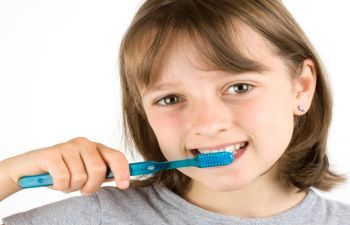
From the time your child’s first tooth erupts, oral health becomes a concern. It is important to start good habits early. In this way, you begin building a firm foundation for oral health that can last a lifetime. One of the first steps in protecting your child’s teeth begins with establishing a good relationship with the dentist; that and understanding your part in helping your child develop good oral hygiene.
Many individuals had poor or no experience with dentists during their childhood and developed fear or mistrust that followed them into adulthood. Now they only visit the dentist when something is seriously wrong. This way of operating only solidifies the notion that going to the dentist is an unpleasant experience. Creating a positive relationship with the dentist and oral health early in life can help eliminate the apprehension that is so common among patients.
The First Dental Visit
The first teeth to erupt are the four front teeth. Two on the top and two on the bottom; and they usually come in when the child is about six months old. The American Academy of Pediatric Dentistry and the American Dental Association recommend that a child’s first dental examination should occur after the first tooth erupts or at least by the first birthday.
While this may seem unnecessary, parents can learn how to maintain good oral health for their child early on before problems develop. Not all parents are aware of the necessity of cleaning their infant’s teeth after nursing or the importance of not letting the baby go to sleep with a bottle of milk or juice. This practice can lead to “bottle mouth,” which is a condition where the upper front teeth and molars become decayed.
Sugars from the juice or milk feed bacteria in the mouth, which in turn cause cavities to develop in the teeth. Simply wiping the teeth with a soft washcloth after eating can prevent this. The hygienist or dentist can also show parents how to clean the teeth with a soft brush as the baby grows older. These early visits also help the child get used to visiting the dental office, so there is less chance of developing dental anxiety as the child grows older.
Good Dental Habits
You can also help protect your child’s teeth by teaching good dental habits. When you begin early with proper brushing and flossing techniques, they become second nature. It is important to begin with proper technique rather than having to unlearn poor habits. Today, with electric toothbrushes and dental flossers, it is easier than ever to practice good oral hygiene.
Get into a routine for brushing and flossing and make it fun. Be sure to stick to the routine as much as possible. Some parents brush their teeth while the children are brushing theirs and it becomes a family routine. This also helps instill the importance of good oral hygiene – and you can make sure your child is doing a good job. Some parents have charts, and they reward good brushing behavior. However you choose to help your child develop and maintain good habits, make sure it is fun and within the child’s capabilities.
Regular Dental Checkups
Annual visits to the dentist are important for every member of the family. Preventive care is the best way to protect teeth and gums from developing problems. If there are issues, they can be addressed early in the process before major trouble begins.
Regular dental checkups are especially important for children because the dentist is not only able to troubleshoot issues with caries, if there are impending problems that will need to be treated with orthodontics later, these can be identified early. In some cases, early intervention can minimize or even eliminate the need for orthodontic treatment.
Additionally, as mentioned earlier, when your child has regular and positive interactions in the dental office, he or she is less likely to develop fears or anxiety about dental visits. Your child may even look forward to these visits, especially when the dentist announces that there are no cavities, and your child is given a clean bill of oral health.
Offer Healthy Foods
Protecting your child’s teeth is not just about keeping them clean and in good condition. Foods and beverages also play a role in ensuring that teeth are healthy. Begin with those first teeth by avoiding bottle mouth, and as your child grows, you will want to monitor their foods and beverages. Minimizing the amount of sugar intake can be difficult as your child grows older. Sodas, candy and other sweet foods and beverages can be challenging to avoid, but for good oral health they should be kept at a minimum.
If you start early offering raw veggies and fruits for snacks rather than chips and other non-nutritious foods, your child will be used to eating healthier. Not only are these good for the teeth, but healthy foods are also good for overall general health. During the developmental years, healthy foods help build strong bones and teeth. Developing good habits around food and beverage choices will help protect your child’s teeth, keep your child’s immune system healthy and establish a preference for healthy foods over junk food. This, along with regular exercise, will also help minimize the chances of your child being obese.
Dental Sealants
Your child’s permanent molars will start coming in at ages six and twelve. It is very important to keep permanent teeth in good condition, since they will hopefully be with your child through adulthood. When molars erupt, they usually have deep crevices and grooves. This is to help with chewing and grinding food. Unfortunately, these grooves and fissures also provide harmful bacteria a place to accumulate and cause tooth decay.
Your dentist can apply dental sealants to these teeth to help prevent decay from developing. The sealants are a type of resin that is placed on the surface of the teeth and hardened. The resin flows into the grooves and crevices so that bacteria cannot accumulate. Sealants last for years, although they may need to be replaced as your child gets older.
Mouthguards
As your child gets older, he or she may be interested in sports. Some, such as football, hockey and lacrosse, require mouthguards as part of the protective equipment needed for playing the game. Other sports do not have these requirements. Mouthguards are optional for other sports that have a high risk of mouth trauma.
Baseball is a particularly high-risk sport for mouth trauma for children ages 7-12. Most of the children seen for sports related mouth trauma in the 12–17 age range are basketball players. A mouthguard could prevent a great deal of these dental emergencies and protect the teeth.
There are various over-the-counter mouthguards available; however, a custom-made mouthguard will fit your child’s mouth correctly and comfortably. A well-fitting mouthguard is preferable because the child is more likely to use it and use it properly, and it will provide the level of protection needed for the sport in which your child is involved. OTC mouthguards can provide minimum protection, but you also need to be aware of the fact that if they are not worn correctly, they could actually cause more harm than good.
Protecting your child’s teeth is not just one thing, but rather a combination of practices that will lead to lifelong habits that promote optimal oral health. Aesthetic & Implant Dentistry of Atlanta can help you ensure that your child has a healthy start for achieving and maintaining a healthy and beautiful smile. Call us today to schedule an appointment with one of our dentists.



